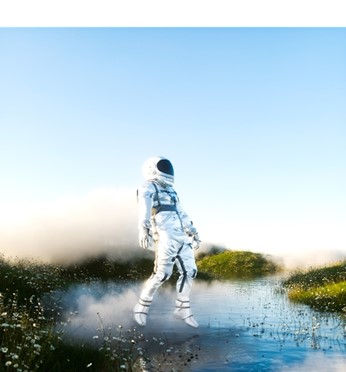Bashawn Jamil Harris is a dedicated lifelong learner, esteemed educator, and district leader driven by an insatiable curiosity and a passion for the boundless realms of science fiction. In the following article, Bashawn Harris of Charlotte delves into the fascinating relationship between sci-fi literature and modern technology, exploring how visionary concepts from the pages of science fiction novels have inspired and influenced the innovations of today.
Science fiction literature transcends mere storytelling, offering vivid glimpses into fantastical worlds brimming with futuristic marvels and groundbreaking technologies. However, its influence extends far beyond the realm of entertainment. This genre has played a pivotal role in shaping the trajectory of real-world technology, inspiring innovators, scientists, and engineers to push the boundaries of what is possible.
Through its imaginative narratives and speculative visions, science fiction has sparked countless innovations, laying the groundwork for transformative advancements that have reshaped our world. From space exploration to artificial intelligence, the influence of sci-fi literature permeates every facet of modern technology, serving as both a catalyst for innovation and a testament to the power of human imagination.
Bashawn Harris Discusses the Birth of Sci-Fi Lit
Before delving into the influence of sci-fi literature on modern technology, it's essential to understand the origins of the genre. Science fiction emerged in the 19th century with pioneers like Jules Verne and H.G. Wells, who envisioned fantastical inventions and journeys to other worlds. Their works, such as "20,000 Leagues Under the Sea" and "The War of the Worlds,"
laid the foundation for a genre that would captivate readers and spark the imagination for generations to come.
 Inspiration for Innovation
Inspiration for Innovation
One of the most significant contributions of sci-fi literature to modern technology is its role as a source of inspiration for innovation. Authors in this genre often imagine futuristic technologies that push the boundaries of what is possible, from space travel and artificial intelligence to virtual reality and nanotechnology. Bashawn Harris explains that these imaginative concepts serve as a springboard for scientists, engineers, and inventors, inspiring them to turn fiction into reality.
For example, the concept of a handheld communication device resembling today's smartphones can be traced back to "Star Trek," where characters used "communicators" to connect instantly across vast distances. Similarly, the idea of self-driving cars, a reality today, was first popularized in sci-fi literature, including Isaac Asimov's "I, Robot" and Philip K. Dick's "Minority Report."
Innovations in Space Exploration
Bashawn Harris notes that perhaps nowhere is the influence of sci-fi literature more evident than in the realm of space exploration. Visionary authors like Arthur C. Clarke and Robert A. Heinlein wrote about journeys to distant planets, encounters with alien civilizations, and the colonization of space long before these ideas became serious considerations for
space agencies like NASA.
Bashawn Jamil Harris remarks that the iconic "2001: A Space Odyssey," both a novel and a film directed by Stanley Kubrick, envisioned space travel on a grand scale, complete with intelligent computers and manned missions to Jupiter. While the technology depicted in the film may have seemed far-fetched at the time, many aspects of it, such as voice-activated virtual assistants and tablet computers, have since become reality.
Influence on Robotics and Artificial Intelligence
Another area where sci-fi literature has had a profound impact is in the development of robotics and artificial intelligence (AI). Bashawn Harris explains that authors like Isaac Asimov explored the ethical implications of intelligent machines in his "Robot" series, introducing the famous
Three Laws of Robotics. These laws, which govern the behavior of robots in Asimov's stories, have influenced real-world discussions about the ethical use of AI and robotics.
Bashawn Harris of Charlotte explains that sci-fi literature often raises thought-provoking questions about the nature of consciousness, identity, and the relationship between humans and machines. Works like Philip K. Dick's "Do Androids Dream of Electric Sheep?" (the basis for the film "Blade Runner") challenge readers to consider what it means to be human in a world populated by artificial beings.
The Role of Sci-Fi in Shaping Society
Beyond its direct influence on technology, sci-fi literature plays a crucial role in shaping societal attitudes and expectations about the future. Bashawn Jamil Harris says that by presenting speculative visions of tomorrow, science fiction encourages readers to contemplate the potential consequences of scientific and technological advancements. This, in turn, can influence public discourse, policy decisions, and investment in research and development.
Conclusion
The influence of sci-fi literature on modern technology is undeniable. From inspiring innovations in space exploration and robotics to shaping societal attitudes about the future, science fiction has left an indelible mark on the world of technology and beyond. As we continue to explore the frontiers of science and imagination, we can look to the pages of sci-fi literature for inspiration and insight into the possibilities of tomorrow.
 Inspiration for Innovation
Inspiration for Innovation